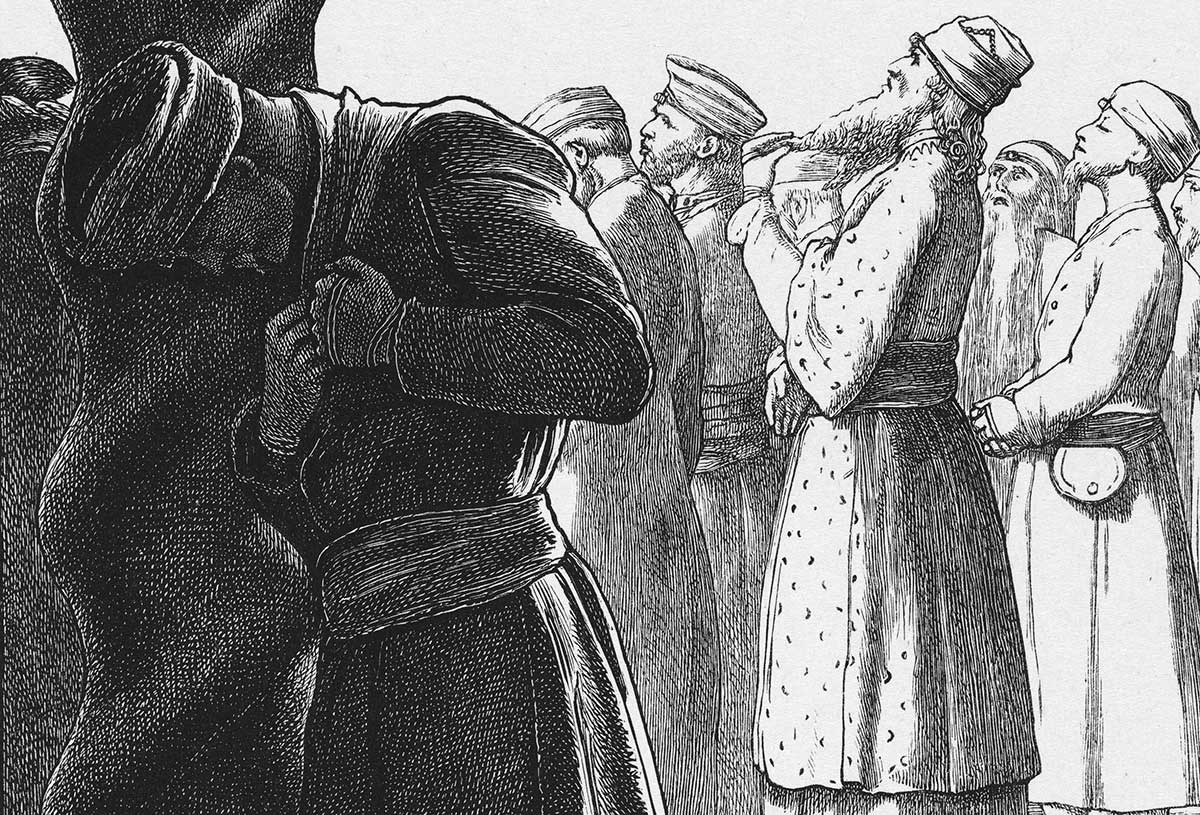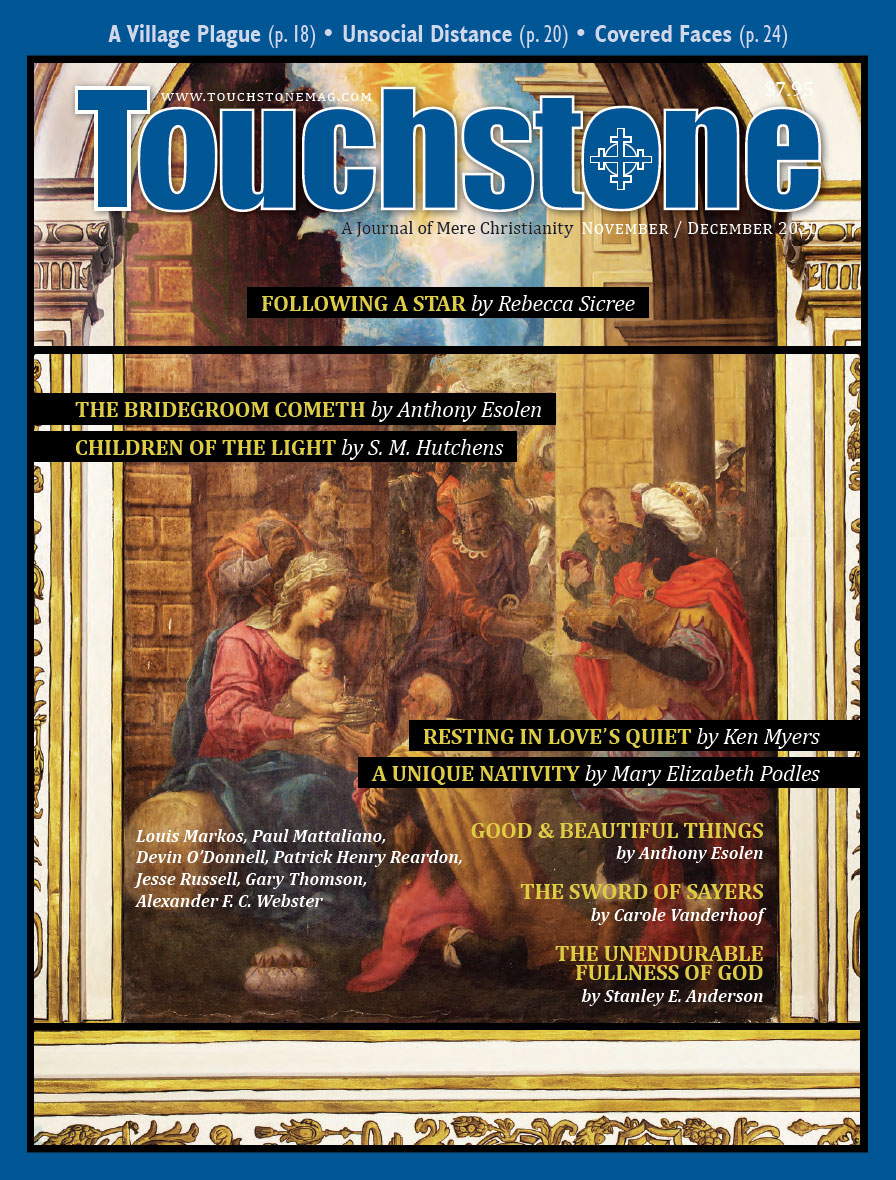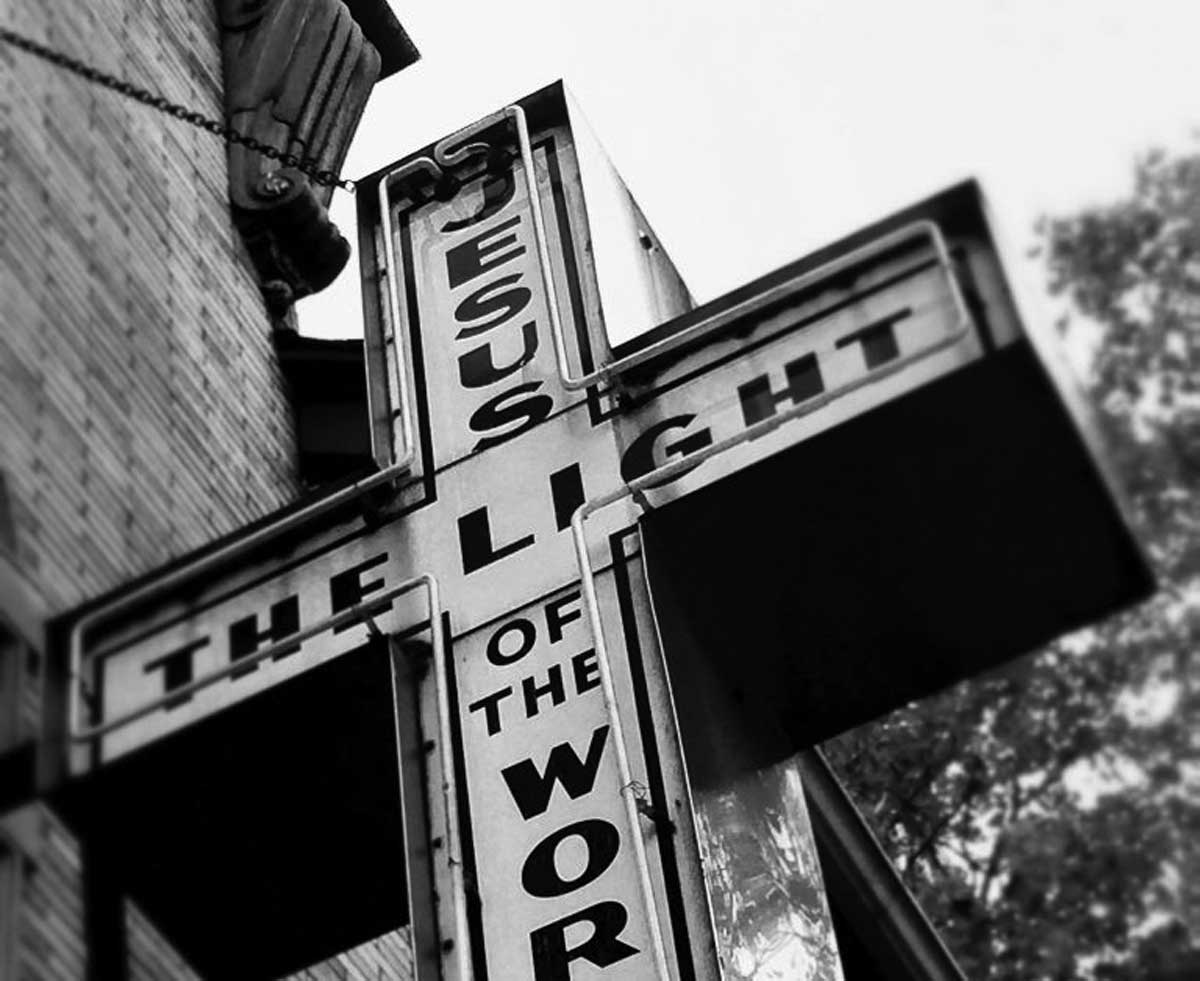View
Social Wandering
Alexander F. C. Webster on One Word That Explains the Current Delusions
We seem to have exhausted our vocabulary to describe the constellation of crises of radical left-wing provenance besetting America of late: extreme, unprecedented, extraordinary, unbelievable, outrageous, horrendous, despicable, frightening, ungodly, Orwellian, and so on. There is one word, however, that may capture our centrifugal culture of hypocrisy, lying, deception, vulgarity, hostility, rage, viciousness, malice, burning, looting, mayhem, destruction, statue-toppling, history-denial, economic class envy, race obsession, madness, and derangement. That word comes from my own Orthodox Christian spiritual tradition.
That word is prelest.
Prelest is how the medieval Slavonic language rendered the older Greek word plani ("wandering" or "going astray"). The fifth-century Greek scholar St. John Cassian translated the Greek plani into Latin as illusio to appeal to the Gauls in the Roman Empire in what is now France. The Latin word would suggest spiritual "delusion." But the root of prelest is the Slavonic lest—"flattery" in English. So we may also translate prelest as "self-flattery." It is a state of mind that leads a person to imagine that he is something that he is not—above all, that he is "holy" or "righteous" or "just" without question, or "holier than thou," as the pejorative English phrase would have it.
In a Russian television interview in July 2018, Professor Alexei Ilyich Osipov of the Moscow Theological Academy in Sergiev Posad explained prelest in this lucid way:
What does it mean when we say, "I flatter myself?" It is not in the sense that I try to convince myself that I am so good, that I am the best in the world. No, you don't even need to convince me, I know that I am good. And it's not at all important to me if someone criticizes me for something; that person is simply a fool, he simply doesn't understand that I am good. That's what it's all about! Well, there are stupid people, it's true. Who is stupid? The one who criticizes me. He doesn't appreciate that I am the best in the world. . . . Prelest is that state in which a person sees himself as a saint. Perfect. Worthy of God, worthy of all God's gifts. . . .
In the Cloisters & Beyond
In the ancient Church—and enduring in Orthodox Christianity to the present—many Church Fathers and spiritual elders have warned monks and nuns, in particular, of the temptation of prelest. Those who embrace the monastic vocation in "fulltime" pursuit of a life of ascetic self-denial, cultivation of the virtues, holiness, and spiritual perfection are, ironically, more likely to succumb to spiritual delusion and self-flattery by regarding themselves as pious saints in the present moment.
I say ironically, because the situation is, prima facie, an inevitable, no-win paradox for monks and nuns. How can they not rejoice in and take satisfaction from their progress on the spiritual path to theosis (i.e., becoming more and more like Christ and, therefore, increasingly like God, without, however, reaching equality with God)? Ought they to slow down that progress lest they become puffed up and fall into prelest? Of course not! As any spiritual father knows, the simultaneous cultivation of the virtue of diakrisis ("discernment") is also necessary for a monk or nun—or any Christian, for that matter—to focus consciously and always on Christ as the telos ("end") and to downplay one's own personal progress as merely a reflection of the glory of the Lord. It's all about Christ, not us.
St. Macarios the Great of Egypt (a.d. 391) saw the same temptation of prelest rampant beyond the monasteries and cloisters: "[A]s there is no person completely free from pride, there is no person who would be completely free from the action on him of a subtle delusion called 'conceit.'" As a false, grandiose understanding of oneself, prelest is most readily expressed to others through pride and conceit, but also through hypocrisy and lying.
Two Kinds of Lying
In his remarkable book The Ladder of Divine Ascent, St. John Climacus, abbot of the renowned Monastery of St. Catherine in the Sinai desert in the early seventh century, linked the last two of those vices: "Hypocrisy is the mother of lying and frequently its cause. Some would argue that hypocrisy is nothing other than a meditation on falsehood, that it is the inventor of falsehood laced with lies."
Two kinds of lying are entailed in prelest. There is, of course, the conscious, intentional, unquestionably sinister lying to which many of us are prone. That is the lying that reveals that one is working for the "father of lies"—that is, Satan—whom our Lord identified as the true "father" of the scribes and Pharisees in John 8:44. Whether to avoid the repercussions of the truth or for personal gain and aggrandizement, that kind of liar effectively welcomes and accepts the third temptation by Satan that our Lord Jesus Christ rejected in the Judean wilderness and falls down and worships Satan in exchange for "all the kingdoms of the world and the glory of them" (Matt. 4:8).
The other kind of lying is neither conscious nor witting. It characterizes a person so engulfed and consumed by pride, self-conceit, and hypocrisy that lying becomes—to echo a popular phrase in our relativist culture—"his truth." All spiritual and rational discernment are squandered, and the soul is wounded grievously, perhaps fatally.
Our contemporary secularized society would describe that kind of lying therapeutically as "pathological" and invoke other terms from psycho-speak such as "compulsive," "obsessive," or "irrational." But I think St. Ignatius Brianchaninov (1867), a Russian Orthodox bishop and prolific theologian, saw more clearly and simply what is at stake here:
Spiritual deception [prelest] is the wounding of human nature by falsehood. . . . All of us are subject to spiritual deception. Awareness of this fact is the greatest protection against it. Likewise, the greatest spiritual deception of all is to consider oneself free from it. We are all deceived, all deluded; we all find ourselves in a condition of falsehood; we all need to be liberated by the Truth.
And why do we succumb to falsehood? St. Ignatius explained:
The source of self-delusion and demonic deception is the false thought. By means of falsehood, the devil infected mankind at its very root, our first parents, with eternal death. For our first parents were deceived, i.e., they acknowledged falsehood as the truth, and having accepted falsehood in the guise of truth, they wounded themselves incurably with mortal sin, as is attested by our ancestor Eve, when she said: "The serpent deceived me, and I ate" (Gen. 3:13). Thenceforth, our nature, infected with the poison of evil, has, voluntarily or involuntarily, inclined toward evil which, to our perverted will, distorted reason, and debauched heart, presents itself as good.
The Grim Reality
Does that sound familiar today? It should. Consider the minions in the mainstream media, major corporations, Hollywood and television, college and university faculties and student bodies, and among countless office-holders in the opposing political party who seem overcome by Trump Derangement Syndrome. Consider also the political "protesters" crusading against "systemic" racism, whom the media insist repeatedly are "mostly peaceful" despite the almost daily images on television of burning buildings, widespread urban looting and destruction, harassment and physical assaults on besieged police officers, violence against hapless homeless souls on the streets and other innocent civilians, and the illegal toppling of statues of Confederate generals, but also Christopher Columbus, George Washington, Fr. Junipero Serra, Andrew Jackson, Ulysses S. Grant, and renowned abolitionists including, and most astonishingly, Frederick Douglass and Abraham Lincoln.
The grim reality is greater than the mere sum of those actions. What all of the perpetrators have in common is the assurance that they are unquestionably "righteous," "just," and, among the reputed Christians and Jews in their midst, even "holy" or "saintly," and that they have the right "ideas" or "thoughts" as to how to govern our society. How often have we Christians had to hear from non-believers, particularly lapsed Christians, that we are self-righteous, judgmental hypocrites? Ironically, they think they're better than us traditional Christians, while denouncing us as racists, bigots, misogynists, homophobes, haters, and deplorables—in breathtaking acts of self-projection—for thinking, supposedly, that we're better than them! Something profound is happening, and that something is best described as prelest on a collective level—a mass spiritual delusion spreading through our society and its institutions at an accelerating pace and on a scale of unprecedented magnitude.
I'm reminded of the Apostle Peter's sobering warning: "Your adversary the devil prowls around like a roaring lion, seeking someone to devour" (1 Pet. 5:8). Another biblical caution with perennial relevance is the Apostle Paul's insight that we Christians "are not contending against flesh and blood, but against the principalities, against the powers, against the world rulers of this present darkness, against the spiritual hosts of wickedness in the heavenly places" (Eph. 6:12).
Our Defenses
All of the above would be enough to drive most, perhaps all, of us faithful Christians to despair—or at least a joyless attitude of resignation and defeatism—if not for the Truth that is already within us.
Genuine self-awareness of who we are and, more important, Whose we are—that we've been "bought with a price," as the Apostle Paul proclaims in 1 Corinthians 6:20, by him who is the Way, the Truth, and the Life—is the first bulwark against the mass prelest around us.
The second line of defense is continual repentance by acknowledging the sin within our own souls and resisting the temptation to judge harshly and hypocritically the souls of others. That means cultivating the virtue of humility. But it does not entail abandoning the use of reason to assess the gravity of our predicament or the reality of the phalanxes of adversaries arrayed against us. Monks and nuns practice that ascetic virtue "fulltime," but even we Christians who live "in the world" and have multiple responsibilities to our spouses, families, workplaces, and local communities can set aside specific times each day and evening for prayer, Bible reading, and penitential disciplines such as the ancient Byzantine "Jesus Prayer" either singly or in rhythmic repetition: "O Lord Jesus Christ, Son of God, have mercy on me, a sinner."
Finally, we need not hide or shrink from a world increasingly hell-bent. On the contrary, we can and ought to go on the offensive—spiritually, that is! Why should we do that? In Romans 10:9–10, the Apostle Paul assured the faithful in the church in the imperial city, and the faithful in all ages and places, "if you confess with your lips that Jesus is Lord and believe in your heart that God raised him from the dead, you will be saved." That act of confession entails witnessing to others, not only quietly to our Lord himself. The Apostle Peter provides a more pointed spiritual counsel as a command:
Always be prepared to make a defense to anyone who calls you to account for the hope that is in you, yet do it with gentleness and reverence; and keep your conscience clear, so that, when you are abused, those who revile your good behavior in Christ may be put to shame. (1 Pet. 3:15–16)
As long as we keep our focus on our Lord God and Savior Jesus Christ and cultivate the virtues proposed above, we shall not, God willing, succumb to the prelest around us and always lurking at our door. And nothing—neither hatred nor scorn, nor even violence—will harm our living souls in the gathering storm.
Alexander F. C. Webster (Archpriest), Ph.D., is Dean & Professor of Moral Theology Emeritus at Holy Trinity Orthodox Seminary in Jordanville, New York, and Adjunct Professor of Religious Studies at George Mason University in Fairfax, Virginia.
subscription options
Order
Print/Online Subscription

Get six issues (one year) of Touchstone PLUS full online access including pdf downloads for only $39.95. That's only $3.34 per month!
Order
Online Only
Subscription

Get a one-year full-access subscription to the Touchstone online archives for only $19.95. That's only $1.66 per month!
bulk subscriptions
Order Touchstone subscriptions in bulk and save $10 per sub! Each subscription includes 6 issues of Touchstone plus full online access to touchstonemag.com—including archives, videos, and pdf downloads of recent issues for only $29.95 each! Great for churches or study groups.
Transactions will be processed on a secure server.
more on culture from the online archives
more from the online archives
calling all readers
Please Donate
"There are magazines worth reading but few worth saving . . . Touchstone is just such a magazine."
—Alice von Hildebrand
"Here we do not concede one square millimeter of territory to falsehood, folly, contemporary sentimentality, or fashion. We speak the truth, and let God be our judge. . . . Touchstone is the one committedly Christian conservative journal."
—Anthony Esolen, Touchstone senior editor













